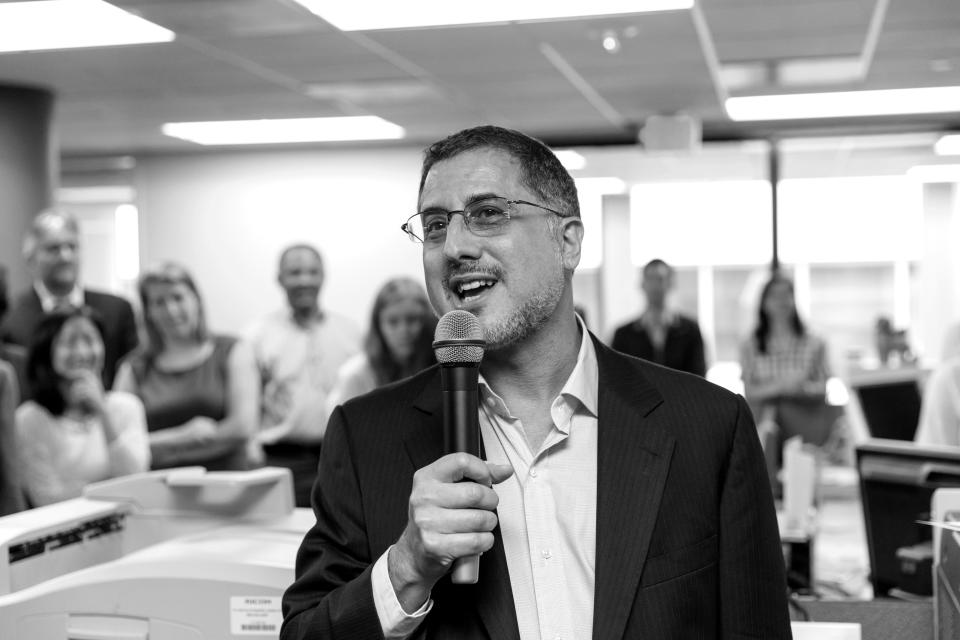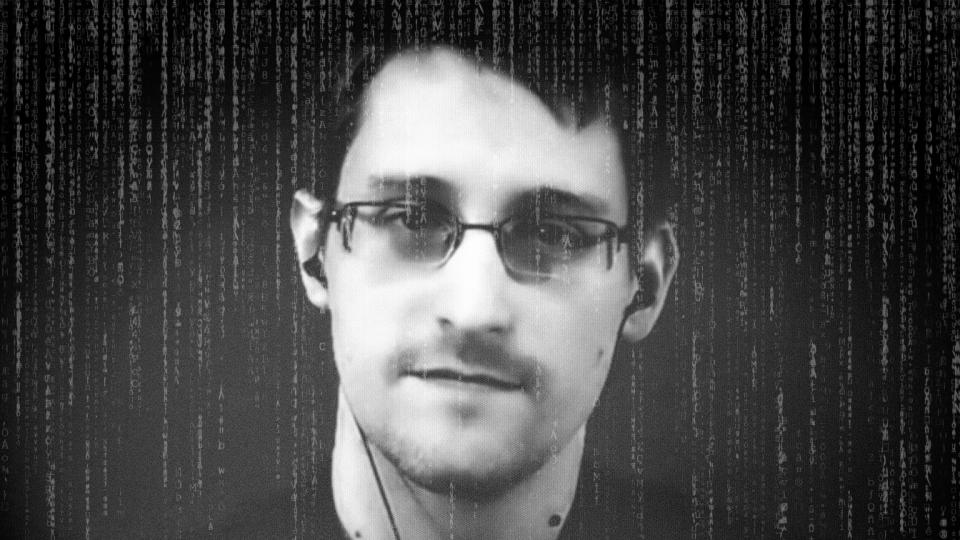Edward Snowden will not be pardoned in his lifetime, says author of new book on the NSA whistleblower
The Pulitzer Prize-winning Washington Post reporter who documented the scope of the U.S. government’s surveillance on its own citizens after receiving leaked National Security Agency documents from Edward Snowden told Yahoo News that he believes the former NSA contractor will not be pardoned in his lifetime.
Barton Gellman, now a staff writer at the Atlantic, was one of three reporters Snowden first approached in 2013 with the archive of documents showing mass surveillance of American citizens by their own government. Gellman’s book about Snowden, “Dark Mirror: Edward Snowden and the American Surveillance State,” was released Tuesday. Gellman, who is sympathetic to Snowden but raises questions about some of his actions, said Snowden will not be able to return to America in his lifetime — unless he comes in handcuffs.
“Getting pardoned is going to be a very, very big lift for any president,” Gellman told Yahoo News’ “Skullduggery” podcast. “The intelligence community, the national security community, loathes Snowden and have long memories for this sort of thing, and I don’t think he’ll be pardoned in his lifetime.”
Gellman has spent significant time with Snowden since first meeting him in 2013 and said his book’s title reflects his own view of the U.S. government’s surveillance capabilities and efforts.
“We’re transparent to our government, our government is opaque to us, and that creates distortions in the balance of power,” he said.
Still, Gellman is clear that his book is not meant to be a full-throated defense of Snowden, who remains in Russia, where he has been since shortly after Gellman and other Washington Post reporters first revealed the NSA’s illegal mass data collection efforts thanks to Snowden’s disclosures.
Snowden had been a Hawaii-based NSA contractor before he made the decision to give Gellman the trove of documents. Snowden then traveled to Hong Kong before continuing on to Moscow in what he has said was a bid to make his way to Ecuador, which has historically refused to extradite criminal suspects to the U.S. After the Guardian and Gellman at the Washington Post first published their stories, Snowden then shared highly classified material with the Hong Kong-based South China Morning Post revealing NSA targets inside China, a revelation that seemed unrelated to his professed concern about wanting to protect the privacy of American citizens. When asked to explain why Snowden chose to leak information about U.S. intelligence gathering efforts in China to the South China Morning Post, Gellman said he would not defend what Snowden did.
“I have no defense of the South China Morning Post story; Snowden’s view was that he was showing that even universities and hospitals — that is, not defense facilities or foreign ministers — were a target,” Gellman said of the disclosures to a hostile foreign government. “I would not have published that story, because I don’t publish stories that warn specific foreign targets of legitimate foreign adversaries that they’re being spied on.”

Download or subscribe on iTunes: “Skullduggery” from Yahoo News
Over the years, Gellman and Snowden have debated the surveillance state and its importance, sometimes ending up on opposite sides of the debate. Gellman said Snowden intrigues him in part because of how far he was willing to go to reveal sensitive and previously unknown NSA practices such as the illegal bulk collection of phone records. Congress outlawed the practice in 2015, a step that almost definitely would not have happened without Snowden’s revelations.
“Why do people like Snowden do what they do?” Gellman asked. “Most people are going to go along and get along. ... It requires a supreme confidence in your own sense of right and wrong, which Snowden does have. And it requires a sensibility that can’t tolerate inaction.”
Gellman said that despite speculation by others that Snowden is a Russian spy, he just doesn’t believe it based on his experiences with the whistleblower. Russian President Vladimir Putin has said Snowden reached out to Russian diplomats based in Hong Kong during the two weeks he spent there before the story broke, but Gellman said he spent significant time investigating Snowden’s relationship with Russia and has concluded that Snowden is not a Russian asset.

Gellman pointed to the fact that Snowden ended up in Moscow when his passport was revoked en route to Cuba and then Ecuador — Gellman said he has seen Snowden’s plane ticket, which showed a final destination in Ecuador. And Snowden urged him not to bring any of the documents he shared with him on a trip to Russia, hardly a warning one would expect from a Russian intelligence operative hoping to access as much material as possible. As for what Putin said, Gellman concludes the Russian president may have wanted to “leave a false trail or to poke the Americans.”
Whatever Snowden’s historical relationship with the Russian government, it is evident that Putin sees tremendous value in having Snowden remain in Moscow, where U.S. authorities can’t touch him. Gellman said he believes Putin enjoys his role as international human rights defender protecting a whistleblower like Snowden. Even Snowden realizes he is a prize for Putin and is open about it, Gellman said.
“Snowden has also acknowledged to me, and I thought it was very interesting, that Putin has reason to protect him, because although he is not in fact a Russian agent, he might look that way to other people and Putin does not want to discourage walk-ins by foreign intelligence officers of other countries,” Gellman said. “If he sent Snowden back, that would make people wary ... so Snowden says, ‘Even though I am not a spy, he is treating me as though I were so that he doesn’t blow chances with somebody else.’”
_____
Click here for the latest coronavirus news and updates. According to experts, people over 60 and those who are immunocompromised continue to be the most at risk. If you have questions, please refer to the CDC’s and WHO’s resource guides.
Read more:


